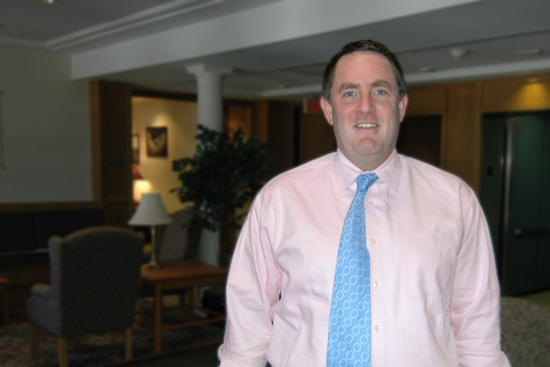General Counsel Advises University on Policies, Contracts, Litigation Issues
 |
| David Winakor is Wesleyan’s first general counsel and represents the university on issues affecting the university. |
| Posted 02/01/08 |
| According to David Winakor, lawyers and doctors often have something in common.
We cant always tell you what exact illness or illnesses you might have, but we can probably help treat some symptoms and maybe even prevent it from getting worse, Winakor says. Although our issues are very different, we are both trained to find the answer. As a lawyer and Wesleyans first General Counsel, Winakor represents the university, its trustees, officers, faculty and staff, all in their official capacities, on various issues affecting the institution. By knowing and researching state, federal and case law, and imparting a dose of common sense, he is the universitys go-to person for legal advice. Winakor estimates that probably less than half of Wesleyans peers have their own General Counsel, and larger institutions and state schools may have more than 15 lawyers staffed in-house. As a member of the National Association of College and University Attorneys, Winakor communicates with fellow institutional lawyers on ways to enhance legal assistance to member schools. Wesleyan and other smaller schools have to do everything larger intuitions do from regulatory, compliance, litigation to handling student issues. Our volume of student or faculty issues might be lower but our breadth is the same, Winakor explains. John Meerts, vice president for finance and administration, created the Office of the General Counsel in 2007. His goal was to reduce the cost of hiring external law firms and have an in-house attorney with institutional knowledge. Winakor was hired in July as Wesleyans first full-time counsel. At Wesleyan, working in a liberal arts environment, there is an endless supply of cutting edge issues. Ill never be at a loss for unique challenges to explore and respond to, Winakor says. At Wesleyan, Winakor divides his workload into six categories, including contracts, real estate, human resources, litigation, policies, and a broad category of miscellaneous issues. A key and somewhat obvious goal throughout is to reduce Wesleyans legal costs through prevention, appropriate and timely legal responses, and hard work. Mulling through contracts takes up a significant portion of the Winakors time, and he seems to encounter a constant flow of them across his desk. When a department needs to purchase equipment or a service above certain dollar values or outside of University policy limits, Winakor will discuss the deal with the parties and review the fine print. Recent contracts include warranties for new science equipment, investment agreements, banking arrangements, engagement agreements on major construction projects, and a wide variety of technology sharing or transfer agreements. In addition, Winakor wrote a contract to formalize a service level agreement between Wesleyan and members of the Consortium on Financing Higher Education who use Wesleyans electronic portfolio. Dave has been fabulous in helping write the contracts for us, says Ganesan Ravi Ravishanker, associate vice president for Information Technology Services. Most recently, he helped us finalize the Comcast cable TV contract for students. Winakors role with real estate involves working with Joyce Topshe, assistant vice president for facilities on real estate transactions and major project documentation. He has also worked with Human Resources to resolve disputes with employees or hiring process concerns. For university litigation issues, Winakor will represent Wesleyan and manage continuing litigation. Wihile any institution will face disputes, Winakor says his job is to avoid, mediate, manage and resolve disputes at all levels so that the university is not unnecessarily exposed and can better serve its students. Writing or revising current Wesleyan policies is an issue Winakor has also moved to the forefront. His primary goal is to build a code of conduct for the university in order to make all employees aware of the schools most critical policies including issues of discrimination and harassment, conflict of interest, contracting, incident reporting and antitrust policies. Key human resources policies are already written and posted on the HR website, but we want to find a way to bring more attention to them along with the other core policies that need to be at the forefront of what we do. Winakor explains. A conflicts of interest policy is one such core policy that needed immediate attention and which was recently adopted. Hes also already dealt with a hot-button issue on campus: political contests. Since Wesleyan is a 501(c)3 not-for-profit entity as defined by the Internal Revenue Service, the university is prohibited from participation in political activities. Students interested in bringing a candidate to campus had difficulty interpreting on how to legally do so, because of the IRS restrictions. In December, he met with the Student Life Committee and developed a Political Speakers Policy counter-proposal based on students input. So what we ended up doing is drafting a policy to be administered and enforced by the Student Leadership & Activities Office that says on certain days of the week, Wesleyan would allow any and all political candidates to use certain designated facilities so long as the candidates scheduled and supported it themselves and understood that the university does not support or endorse the candidacy of any political candidate, Winakor explains. Prior to Wesleyan, Winakor worked for eight years as the Assistant General Counsel and Vice President for Business Development for The Stanley Works in New Britain, Conn. Prior to that, he practiced corporate and commercial law at Murtha Cullina, LLP in Hartford, Conn. after serving as a commissioned officer in the United States Army. Winakor received his bachelors degree in Geography and Criminal Justice from The Ohio State University and his Juris Doctor from The University of Connecticut School of Law. He lives in Portland with his wife, Laura, and three children, Jonah, 12; Jacob, 10; and Grace, 8. He enjoys photography, coaching his childrens soccer and baseball teams, and rebuilding and restoring cars and motorcycles. |
| By Olivia Drake, The Wesleyan Connection editor |

